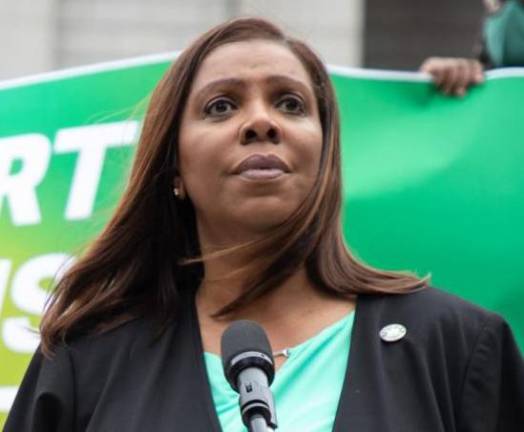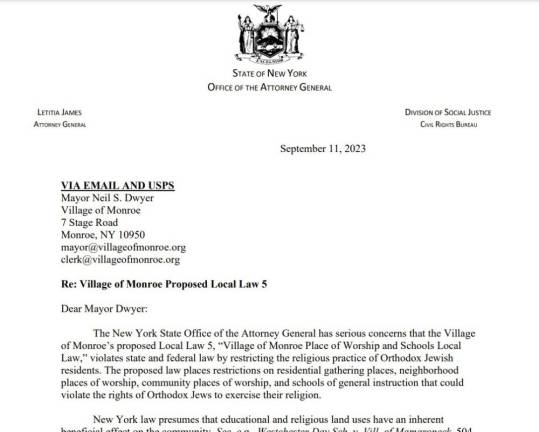NYAG warns Monroe against restricting religious practices
Monroe. A letter sent to village officials asked them to delay further action on proposed Local Law 5.
The Office of New York State Attorney General Letitia James sent a letter to the village of Monroe last month stating that it “has serious concerns that the village of Monroe’s Proposed Local Law 5, ‘Village of Monroe Place of Worship and Schools Local Law,’ violates state and federal law by restricting the religious practice of Orthodox Jewish residents.”
According to the AG’s office, the proposed law “would impose excessive, burdensome restrictions on when, where, and how Orthodox Jewish people in the village of Monroe can practice their religion. Such restrictions would include new limits on religious gatherings at residential gathering places, neighborhood and community places of worship, and schools of general instruction, and would require special use permits that appear designed to disproportionately impact Orthodox Jewish people.”
In the Sept. 11 letter, addressed to Monroe Mayor Neil Dwyer, James advises that proposed Local Law 5 appears to violate the Fair Housing Act and the Religious Land Use and Institutionalized Persons Act. The attorney general urged the Monroe Board of Trustees to delay any further action on Local Law 5 while the proposed law is evaluated and requested that the board provide written justification for the ordinance for review. James’ letter said that if the board did not comply by Sept. 29, her office would seek further action.
The legislative purpose, as stated in Section 2 of the village of Monroe’s Proposed Local Law 5, “Village of Monroe Place of Worship and Schools Local Law,” is to maintain the quiet, relatively private nature of residential village neighborhoods while acknowledging First Amendment rights of worshippers, as outlined below:
“Recently, the village has seen an increased demand for regular large gatherings of people in residential areas, most commonly for worship but possibly for other purposes protected by the First Amendment. Historically, the village’s synagogues, churches and other places of worship were generally located in or on the periphery of commercial areas. The village recognizes that satisfying the religious and other First Amendment needs of residents may result in an increase in the number of non-residential uses located in residential neighborhoods. If designed properly, these gatherings need not impose upon the quiet seclusion of residential neighborhoods.
The village also recognizes that until such gathering places are constructed in neighborhoods, persons may rely on personal residences to satisfy the religious needs of small groups or congregations. The village believes that this is customary and appropriate up to a limit. Residences constructed to residential building code occupancy standards (as opposed to assembly building code occupancy standards) are not appropriate for regular public assembly of groups of significant size. Such a practice may not only endanger the health and safety of the building occupants, but if not designed properly, may impose upon the quiet seclusion of residential neighborhoods.
The law seeks to insure, to the maximum extent allowed by law, that the development of any house of worship or school within its boundaries be consistent with the established residential character of existing neighborhoods, that property value and quality of life is maintained, municipal utilities and the road system are not overburdened and the environment is not deteriorated.”
Also included in the proposed law, the village cites a 1986 Court of Appeals case involving Cornell University in which the court recommended that communities adopt the special permit mechanism to impose “reasonable conditions directly related to the public’s health, safety and welfare” on proposed religious or educational uses and otherwise “cushion any adverse effects [of such uses] by the imposition of conditions designed to mitigate them.”
The village contends that the adoption of this Local Law is in accordance with Section 10 of the New York Municipal Home Rule Law.
It is unclear if the village of Monroe has replied to the attorney general, as multiple calls and emails to Mayor Dwyer went unreturned by press time. Messages left with the attorney general’s press secretary also went unreturned.

